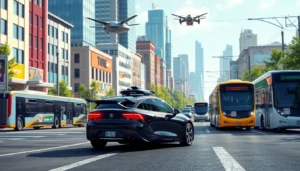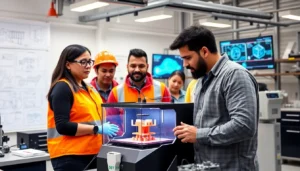Table of Contents
ToggleIn a world where robots might soon take over the coffee-making duties, AI and emerging technologies are revolutionizing the way we live and work. Forget the days of clunky machines and outdated software; today’s innovations are sleek, smart, and sometimes a little sassy. From self-driving cars to virtual assistants that can crack a joke, these technologies are not just changing the game—they’re rewriting the rulebook.
Overview of AI and Emerging Technologies
AI and emerging technologies play a pivotal role in reshaping numerous sectors. They drive progress across industries like healthcare, finance, and transportation. Robust algorithms support real-time data analysis, resulting in improved decision-making.
Self-driving cars exemplify advancements in AI. These vehicles utilize machine learning and computer vision to navigate complex environments. Numerous companies are investing heavily in research and development to enhance their capabilities.
In healthcare, AI-powered tools transform patient care. Systems analyze medical data, expediting diagnoses and personalizing treatments. Many healthcare providers benefit from AI, leading to more efficient and effective services.
Another example includes virtual assistants, which use natural language processing technology. These digital helpers streamline daily tasks, from scheduling appointments to managing smart home devices. Popular platforms continue to strengthen their AI features, enhancing user interactions.
Cybersecurity also benefits from emerging technologies. Innovative AI solutions detect and mitigate threats in real-time. Organizations implement these advanced systems to protect sensitive information and ensure operational continuity.
As AI evolves, ethical implications arise. Concerns surrounding privacy and job displacement require careful consideration. Stakeholders must engage in dialogue to address these challenges while leveraging the opportunities offered by AI.
Investments in AI technologies are increasing. Organizations recognize their potential to enhance efficiency and drive innovation. Research indicates that AI could contribute up to $15.7 trillion to the global economy by 2030.
AI and emerging technologies are not just trends; they represent a fundamental shift in how society operates. Understanding their impact is essential for navigating the future landscape of work and daily life.
Key Components of AI
AI encompasses several vital components that drive its effectiveness and applications. These components include machine learning, natural language processing, and computer vision.
Machine Learning
Machine learning involves algorithms that enable systems to learn from data. These algorithms identify patterns in large datasets, facilitating predictions and decisions. Various types exist, including supervised learning, unsupervised learning, and reinforcement learning. In healthcare, machine learning helps predict patient outcomes based on historical data. Industries use machine learning to improve accuracy in diagnostics, automate processes, and enhance customer experiences.
Natural Language Processing
Natural language processing focuses on the interaction between computers and human language. By leveraging linguistics and AI, it creates systems that understand, interpret, and generate human language. Applications range from chatbots to sentiment analysis tools that gauge consumer emotions. With natural language processing, businesses improve customer service and engagement by providing meaningful responses. Its impact extends across various sectors, including education and entertainment, enhancing user interactions.
Computer Vision
Computer vision enables machines to interpret and process visual information. By analyzing images and videos, systems can recognize objects, faces, and scenes. Applications of computer vision occur in autonomous vehicles, where it aligns perfectly with real-time navigation and obstacle detection. Retailers use computer vision for inventory management and enhancing shopping experiences. With advancements in this area, efficiencies in various fields continue to grow as visual data processing becomes more precise and reliable.
Impact of Emerging Technologies on Industries
Emerging technologies significantly influence various industries, driving innovation and enhancing operational efficiency. The integration of these technologies results in transformative changes across sectors.
Healthcare Innovations
AI-powered tools are redefining healthcare. By analyzing extensive medical data, these tools expedite diagnoses and tailor treatments, ultimately improving patient outcomes. From predictive analytics to robotic-assisted surgeries, innovation enhances accuracy and speed in medical services. Companies increasingly implement machine learning algorithms, leading to more personalized care. Virtual assistants now assist healthcare providers, streamlining administrative tasks. The focus remains on patient comfort and optimal service efficiency.
Financial Sector Enhancements
Emerging technologies reshape the financial landscape. The implementation of AI and blockchain solutions enhances transaction security and speeds up processing times. Fraud detection systems use advanced algorithms to monitor transactions in real-time, significantly reducing financial risks. Customer service experiences improve through chatbots that address inquiries instantly, offering efficient assistance. These technological advancements promote financial inclusion, enabling broader access to services for diverse populations.
Automation in Manufacturing
Manufacturing processes see dramatic improvements through automation and robotics. Industrial robots perform repetitive tasks, ensuring consistent quality while minimizing human error. This automation boosts production rates and reduces operational costs. IoT devices provide real-time data on equipment performance, enabling predictive maintenance and reducing downtime. Manufacturers increasingly rely on these intelligent systems to enhance productivity and responsiveness in a competitive market. This shift paves the way for smarter factories, driven by data and efficiency.
Ethical Considerations in AI
Ethical considerations in AI form a crucial discussion as technology continues to advance. These considerations primarily focus on bias, fairness, and privacy concerns.
Bias and Fairness
AI systems can perpetuate bias if developers don’t carefully curate training data. Inaccurate data representation can lead to unfair outcomes in decision-making processes. Algorithms trained on biased datasets can disproportionately affect marginalized groups, causing systemic inequalities. Addressing bias requires implementing fairness assessments throughout the AI lifecycle. Continuous evaluation and iteration help in identifying and mitigating potential biases in algorithms. Stakeholders must prioritize inclusive data practices to promote equitable outcomes in AI applications.
Privacy Concerns
Privacy concerns arise as AI integrates deeper into daily life. User data collection often occurs without explicit consent, raising ethical questions about data ownership. Organizations must comply with regulations like GDPR, ensuring transparency in data usage. Lack of transparency can erode trust between consumers and technology providers. Implementing robust encryption methods and anonymization techniques enhances data security. Highlighting data protection fosters confidence in AI technologies, empowering users to control their information.
Future Trends in AI and Emerging Technologies
Emerging technologies continue to shape the future landscape of industries and daily life, particularly through advancements in AI.
Advancements in Robotics
Robotics is experiencing rapid growth, simplifying complex tasks across various sectors. Robots designed for precision in manufacturing enhance productivity and maintain quality standards. Collaborative robots, or cobots, work alongside human operators, supporting tasks while prioritizing safety. Advanced robotics utilized in healthcare perform surgeries with exceptional accuracy, improving patient outcomes. Drones equipped with AI capabilities provide automation in logistics and delivery, accelerating supply chain operations. Innovations in robotics promise to revolutionize sectors by integrating intelligence and adaptability, creating a more efficient workforce.
Integration of IoT and AI
The integration of IoT and AI creates interconnected systems that enhance data analysis and decision-making. Smart devices equipped with sensors gather real-time data, facilitating seamless communication between machines. This synergy improves operational efficiency in industries like manufacturing and agriculture, enabling businesses to optimize resources. AI algorithms analyze IoT-generated data, identifying patterns and actionable insights that drive innovation. Autonomous vehicles rely on real-time data from multiple sources to navigate safely and efficiently. As IoT and AI technologies evolve, sectors will benefit from enhanced automation and smarter solutions.
AI and emerging technologies are reshaping the world in profound ways. Their influence spans across various sectors, enhancing efficiency and redefining interactions. As these innovations continue to evolve, they promise to unlock new opportunities while also presenting challenges that require careful consideration.
The integration of AI in daily life fosters smarter solutions and improved services. However, addressing ethical concerns and ensuring data privacy remain critical. Stakeholders must engage in ongoing dialogue to navigate the complexities of this technological landscape.
Looking ahead, the potential for AI to drive economic growth and transform industries is immense. Embracing these changes will be vital for individuals and organizations alike as they adapt to this new era of intelligence and automation.







